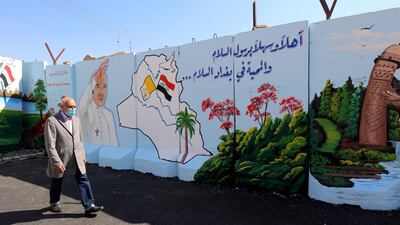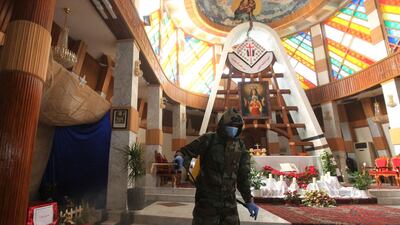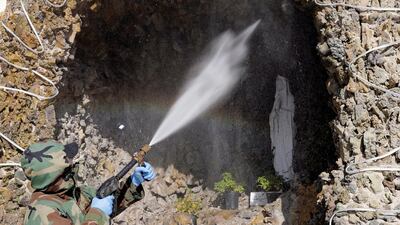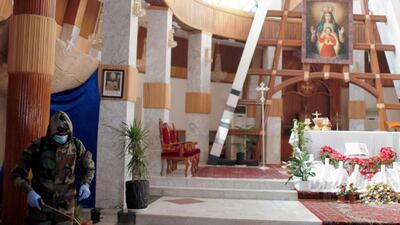Yasmin Philip wishes she could be at Baghdad’s Our Lady of Salvation Church on Friday to witness the moment Pope Francis enters the site of one of the worst massacres of Christians in Iraq.
The place of worship, a Baghdad landmark, was turned into a scene of slaughter on October 31, 2010, when armed men burst in on the congregation gathered for a Sunday service.
Fifty-eight people, most of them worshippers from Iraq’s Assyrian Catholic community, including two priests, were killed in the four-hour attack that left bloodstains, pieces of flesh, shell casings and bullet holes scattered inside the church.
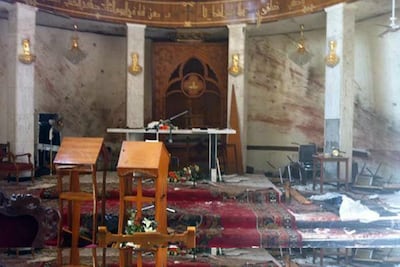
It was a day that changed many lives including Ms Philip's, and left her dwindling community in despair.
Her 82-year-old mother and 45-year-old brother were killed.
"Until now we are all suffering. It has impacted our lives, families and future. It took me a while to recover. I still can't believe what happened and can't erase what I saw," Ms Philip told The National.
After the attack she rushed back to Iraq from her home in London, where she has lived since the early 1990s, to bury her mother and brother.
“I went to the church and saw the blood and people’s flesh on the walls. How can I erase that?” she said.
“I can forgive but I cannot forget.”
Pope Francis will visit pray for the lives lost at the church and encourage members of Iraq’s beleaguered Christian community who fled the country to return home.
Ms Philip described the Pope's move as "spectacular", one that will draw international attention to the historical importance and significance of Iraq as well as the church attack.
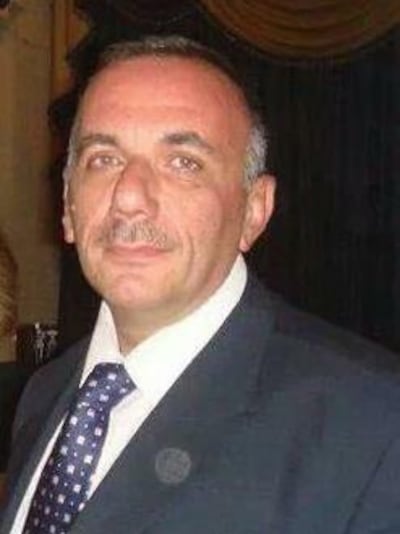
Among the first to die
Six terrorists, who identified themselves as an Al Qaeda-affiliated group, came armed with guns, grenades and explosive vests. They told the worshippers to lie on floor and stay still, otherwise they would be killed instantly, according to survivors of the attack.
They had reportedly demanded the release of jailed Al Qaeda militants and several Muslim women they insisted were being held prisoner by the Coptic Church in Egypt.
The church priests attempted to speak to them and were immediately shot.
“My brother, Fares Hanawi, was one of the first people that were killed, someone had shot him from above (as the church has two levels) after he raised his head to see if the priest had been killed,” said Ms Philip, who spent eight months piecing together what happened.
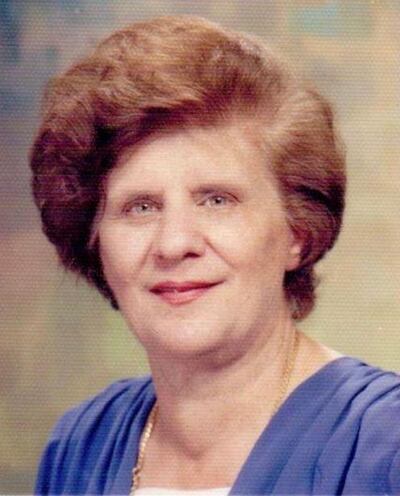
Her mother, Feefeen Marrow, who was lying on the floor next to Fares, looked up on feeling something warm on her hands and realised he had been shot.
“My mother got up and walked towards the terrorists, she told them to get an ambulance for my brother. In response they threw a grenade at her and she was killed instantly,” Ms Philip said.
“It was like a battlefield.”
The attack lasted hours several as the security forces surrounded the church and helicopters hovered overhead. The terrorists spoke to the authorities by mobile phone to make their demands. The security forces stormed the church after the negotiations stalled.
Ms Philip, who flew back to Baghdad from London with her sister, recalls an incident on the day of the funerals that she cannot seem to forget.
“My mother and brother were bought by car from the hospital to the Church and when we finished the prayers the car broke down,” she said.
“I turned to my sister and said, they don’t want to leave us. I said, the car isn’t working, they know we are here and they don’t want to go.”
Iraq’s Christians, who once numbered at least 1.5 million out of a total population of about 30 million, have been the target of insurgents since the 2003 US-led invasion, with churches bombed and priests assassinated.
Many have fled.
“I’m compassionate to every woman or man who has lost a loved one,” Ms Philip said.
“We are brothers bound by love.”


